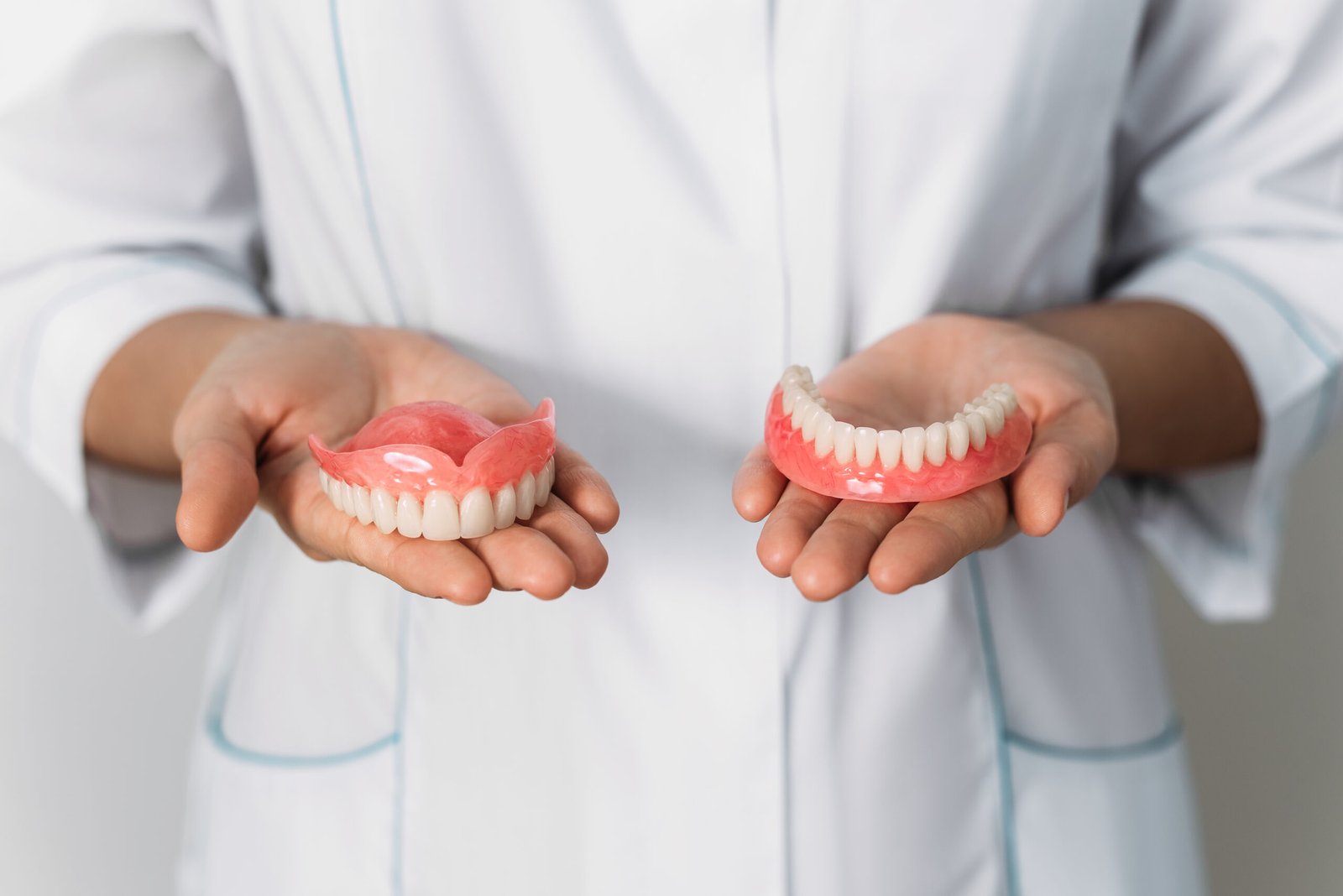Missing teeth can impact your confidence, oral health, and quality of life. Fortunately, modern dentistry offers effective tooth replacement options, primarily dental implants and dentures. Both serve the purpose of restoring function and aesthetics, but they differ significantly in design, comfort, longevity, and cost.
So how do you decide whether dental implants or dentures are right for you? This in-depth guide explores everything you need to know — from benefits and drawbacks to cost comparisons and lifestyle implications — to help you make an informed decision.
What Are Dental Implants?
Dental implants are permanent tooth replacements that involve surgically placing a titanium post into the jawbone. This post acts as an artificial tooth root, upon which a crown, bridge, or denture can be mounted.
Key Components:
- Implant Post (Titanium screw inserted in the jawbone)
- Abutment (Connects the post to the prosthetic tooth)
- Crown (Visible artificial tooth)
Dental implants can be used for:
- Single missing teeth
- Multiple missing teeth (implant-supported bridges)
- Full-mouth restoration (all-on-4 or all-on-6 implants)
What Are Dentures?
Dentures are removable appliances made to replace missing teeth and surrounding tissues. They are custom-designed to fit your mouth and can be either:
- Full Dentures: Replace all teeth in the upper or lower jaw
- Partial Dentures: Replace some missing teeth and attach to remaining natural teeth
They are typically made of acrylic, nylon, or metal and sit on top of the gums.
Key Differences Between Dental Implants and Dentures
| Feature | Dental Implants | Dentures |
| Permanence | Fixed | Removable |
| Comfort | Feels like natural teeth | May cause soreness or discomfort |
| Jawbone Health | Prevents bone loss | Does not prevent bone loss |
| Longevity | 20+ years with care | 5–10 years |
| Stability | Very stable | May slip or move |
| Procedure Time | Longer, involves surgery | Quicker process |
| Cost | Higher upfront | Lower upfront |
Pros and Cons of Dental Implants
Pros:
- Permanent and long-lasting
- Feels and looks like natural teeth
- Prevents jawbone deterioration
- No slipping or clicking
- Doesn’t affect adjacent teeth
- No need for adhesives
Cons:
- Surgical procedure required
- Longer healing period (3–6 months)
- Higher upfront cost
- May not be suitable for patients with poor bone density or chronic illness
Pros and Cons of Dentures
Pros:
- Non-invasive and easy to fit
- More affordable initially
- Quick solution for tooth loss
- Can be modified as your mouth changes
- Suitable for patients with weak jawbones
Cons:
- Can feel bulky or unnatural
- May shift or slip while eating or talking
- Requires adhesives
- Does not prevent bone loss
- Needs regular replacement or adjustment
Cost Comparison
| Treatment | Average Cost (USD) |
| Single Dental Implant | $3,000–$6,000 |
| Full Mouth Implants (All-on-4) | $15,000–$30,000 per arch |
| Complete Dentures (Upper & Lower) | $1,000–$3,000 |
| Partial Dentures | $700–$1,800 |
Note: Prices vary based on geography, dentist’s expertise, materials used, and insurance coverage.
Durability and Maintenance
Dental Implants:
- Can last 20+ years, often for a lifetime
- Regular brushing, flossing, and dental visits are sufficient
- Do not decay
Dentures:
- Typically last 5–10 years
- Require daily cleaning
- Can warp, crack, or discolor over time
- May need relining or rebasing
Comfort and Functionality
Dental Implants:
- Feel like real teeth
- No pressure on gums
- Stable when chewing or speaking
Dentures:
- May cause sore spots or irritation
- Reduced bite strength
- Learning curve for speaking and eating
Aesthetic Considerations
- Implants offer a more natural look and maintain facial structure over time.
- Dentures may look good initially but can cause sunken cheeks due to bone resorption.
Impact on Jawbone Health
Dental implants stimulate the jawbone like natural teeth, preventing bone loss and facial collapse. Dentures, on the other hand, rest on the gums and do not stimulate the jawbone, leading to progressive bone resorption.
Procedure and Recovery Time
Dental Implants:
- Requires dental surgery
- Healing time: 3–6 months
- Additional procedures like bone grafting may be needed
Dentures:
- No surgery required (unless teeth need extraction)
- Ready within a few weeks
- Minimal recovery time
Insurance and Financing Options
- Many insurance plans partially cover dentures, but few cover implants fully.
- Flexible payment plans and medical credit cards (e.g., CareCredit) are often available.
- Long-term costs may favor implants due to fewer replacements over time.
Who Is the Ideal Candidate for Each?
Ideal Candidate for Dental Implants:
- Good oral and overall health
- Healthy gums and sufficient jawbone
- Non-smoker or willing to quit
- Committed to oral hygiene
Ideal Candidate for Dentures:
- Significant tooth loss
- Weak or insufficient jawbone
- Budget constraints
- Preference for non-surgical options
Common Myths Debunked
- Myth: Dentures are outdated.
Truth: Modern dentures are much more advanced and natural-looking. - Myth: Dental implants are painful.
Truth: Most patients report only mild discomfort post-surgery, which resolves quickly. - Myth: Only older adults need dentures.
Truth: Tooth loss can happen at any age, and dentures may be a valid solution. - Myth: Implants are not worth the cost.
Truth: While expensive initially, implants may save money long term due to fewer replacements and better oral health.
Choosing the Right Option: Expert Advice
When choosing between dental implants and dentures, your dentist will consider:
- Number of missing teeth
- Bone density and gum health
- Medical history (diabetes, heart conditions, smoking)
- Budget and insurance
- Your personal preference and lifestyle
It’s best to schedule a consultation with a prosthodontist or implant specialist to evaluate all these factors and discuss possible outcomes.
Final Verdict
Dental Implants are ideal for those who want a permanent, low-maintenance, and natural-looking solution and who meet the necessary health criteria. They offer unmatched stability and jawbone preservation.
Dentures, meanwhile, offer a cost-effective, non-surgical, and customizable option for those who may not be candidates for implants or are seeking a quicker solution.
Still Confused? Here’s a Quick Checklist
| Criteria | Choose Dental Implants | Choose Dentures |
| Long-term investment | tick | cross |
| Comfortable with surgery | tick | cross |
| Need quicker solution | cross | tick |
| Budget limitations | cross | tick |
| Jawbone health priority | tick | cross |
| Stable chewing power | tick | cross |
| Removable option desired | cross | tick |
Ready to Restore Your Smile?
Whether you choose dental implants or dentures, the important thing is to take action toward restoring your oral health and self-confidence. Contact Dentist Americas today to evaluate your options and take the first step toward a healthier, happier smile.





